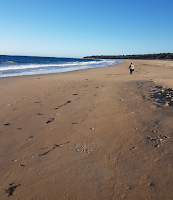I have found it useful, when facilitating groups, to spend a
session with the participants on valuing differences between group members,
especially if there have been issues with group dynamics.
Different ways of viewing our worlds
I modified the following from Experiential Activities for Intercultural Learning by H.Ned Seelye,
Intercultural Press, Yarmouth, MN 1996 to give as a handout as a basis for
discussion.
This is based on three ways of viewing our worlds –
activity, time and human relationships, with orientations within each.
1. Activity
People may be more oriented to Doing/ Take
action, Being/ Self-expression or Becoming/ Self-development.
For people more oriented to doing, taking action is the most
important activity and relationships are less important than the task. These people
find meaning in accomplishments and achievements.
For people who are oriented towards being, self-expression is the most
important activity and they like to build relationships, even at work. They find
meaning in spontaneous expression, being themselves and being connected with others.
For people who are oriented towards becoming, self-development is the most
important activity and the process of tasks will be important to them. They find
meaning in the process, purpose and intention of activities.
2. Time
People may focus on time as the Past, Present
or Future.
People oriented towards the past believe that today flows out of
the legacy of the past. Relationships and traditions are important to them and
they find meaning in serenity, surrender, history and the lessons from history.
People oriented to the present believe that today is the only reality. They believe that
life is to be enjoyed and find meaning in “seizing the day”.
People oriented to the future believe that today is a step towards tomorrow’s goals and
they find meaning in deadlines and goals, always focusing on the next achievement
rather than being satisfied with what they have accomplished. They find meaning
in setting and working towards goals.
3.
Human relationships
People may be more focused on Individual,
Ranked or Mutual relationships.
People oriented towards the individual believe that each person is responsible
for what happens in their life and must watch out for their own rights and welfare.
They find meaning in personal accountability and value competition.
People oriented towards ranked believe that each of us had our
own place and respect is due to one’s position. They find meaning in tradition,
hierarchy, family and protocol.
People oriented towards mutual believe that their purpose is to
make a contribution to the larger whole. They find meaning in interdependence,
group goals and connections with people.
Some other ways we may be different
Four other dimensions are presented in this
handout, which can be referenced to Trent, J, Cox R & Tooker E (2006) Parenting from your strengths: understanding
strengths and valuing differences in your home B&H Publishing Group.
These are:
1.
Procedures (on a continuum from conservative to
independent).
2.
Attitude towards people (on a continuum from
trusting, accepting and optimistic, to sceptical, questioning and realist).
3.
How we deal with problems (on a continuum from
aggressive, problem solver/ solve it, to passive, analyse it).
4.
The pace at which we make decisions (on a
continuum from wanting a predictable environment and resisting change, to
liking a changeable environment and accepting change).
Using the handouts
Group members are asked to look at the
handouts and think about where they fit on each of the scales. Some conclusions
they may draw from this are that everyone is an individual and should be treated
as such, differences make things interesting, we may be all of the things at different
times, it would be boring if everyone was the same, if everyone was the same in
a group the group would not work well, differences can lead to conflict but so
can sameness, and differences can be good.
Using a poem
After reading the following poem, the group
discusses what good things differences bring.
If all the trees were oaks
What
if all the trees were oaks,
How
plain the world would seem:
No
maple syrup, banana splits,
And how
would orange juice be?
Wouldn’t
it be a boring place,
If
all the people were the same;
Just
one colour, just one language,
Just
one family name!
But
If
the forest were the world,
And all
the people were the trees;
Palm
and pine, bamboo and willow,
Live
and grow in harmony.
Aren’t
you glad, my good friend,
Different
though we be;
We are
here to help each other,
I
learn from you, and you, from me.
Author
unknown.
In what ways can we value, nurture and support our differences?
The session ends with a brainstorm based on
this question and can elicit responses such as: focus on positives rather than
negatives in others, appreciate the differences in others, learn from each
other, work together, encourage each other, look for things each person is good
at, and see each person as important as everyone else.







